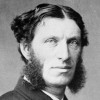Quotations by:
Arnold, Matthew
With aching hands and bleeding feet
We dig and heap, lay stone on stone;
We bear the burden and the heat
Of the long day and wish’t were done.
Not till the hours of light return
All we have built do we discern.
Yet they, believe me, who await
No gifts from chance, have conquered fate.Matthew Arnold (1822-1888) English poet and critic
“Resignation,” The Strayed Reveller and Other Poems (1848)
(Source)
What is the course of the life
Of mortal men on the earth?—
Most men eddy about
Here and there—eat and drink,
Chatter and love and hate,
Gather and squander, are raised
Aloft, are hurl’d in the dust,
Striving blindly, achieving
Nothing; and, then they die—
Perish; and no one asks
Who or what they have been,
More than he asks what waves
In the moonlit solitudes mild
Of the midmost Ocean, have swell’d,
Foam’d for a moment, and gone.
For rigorous teachers seized my youth,
And purged its faith, and trimm’d its fire,
Show’d me the high white star of Truth,
There bade me gaze, and there aspire;
Even now their whispers pierce the gloom:
What doest thou in this living tomb?Matthew Arnold (1822-1888) English poet and critic
“Stanzas from the Grande Chartreuse,” st. 12, Fraser’s Magazine (1855-04)
(Source)
On his tour of a seventeenth-century monastery in Grenoble, in the French Alps, the headquarters of the Carthusian order of Catholic monks .
But often, in the world’s most crowded streets,
But often, in the din of strife,
There rises an unspeakable desire
After the knowledge of our buried life;
A thirst to spend our fire and restless force
In tracking out our true, original course;
A longing to inquire
Into the mystery of this heart which beats
So wild, so deep in us, to know
Whence our lives come and where they go.
Yet the will is free;
Strong is the soul, and wise, and beautiful;
The seeds of god-like power are in us still;
Gods are we, bards, saints, heroes, if we will!
The pursuit of perfection, then, is the pursuit of sweetness and light. He who works for sweetness and light, works to make reason and the will of God prevail. He who works for machinery, he who works for hatred, works only for confusion. Culture looks beyond machinery, culture hates hatred; culture has one great passion, the passion for sweetness and light.
Matthew Arnold (1822-1888) English poet and critic
Culture and Anarchy, ch. 1 “Sweetness and Light” (1869)
Full text.
Nations are not truly great solely because the individuals composing them are numerous, free, and active; but they are great when these numbers, this freedom, and this activity are employed in the service of an ideal higher than that of an ordinary man, taken by himself.
We do not what we ought,
What we ought not, we do,
And lean upon the thought
That chance will bring us through;
But our own acts, for good or ill, are mightier powers.Matthew Arnold (1822-1888) English poet and critic
Empedocles on Etna, Act 1, sc. 2, ll. 238-242 (1852)
(Source)
The sophist sneers: Fool, take
Thy pleasure, right or wrong!
The pious wail: Forsake
A world these sophists throng!
Be neither saint nor sophist-led, but be a man.Matthew Arnold (1822-1888) English poet and critic
Empedocles on Etna, Act I, sc. ii (1852)
Full text.
Thou hast no right to bliss.
Matthew Arnold (1822-1888) English poet and critic
Empedocles on Etna, Act I, sc. ii (1852)
Full text.
Is it so small a thing
To have enjoy’d the sun,
To have lived light in the spring,
To have loved, to have thought, to have done;
To have advanc’d true friends, and beat down baffling foes?Matthew Arnold (1822-1888) English poet and critic
Empedocles on Etna, Act I, sc. ii (1852)
Full text.
The freethinking of one age is the common sense of the next.
Culture, the acquainting ourselves with the best that has been known and said in the world, and thus with the history of the human spirit.
We cannot kindle when we will
The fire that in the heart resides,
The spirit bloweth and is still,
In mystery our soul abides; —
But tasks, in hours of insight willed,
Can be through hours of gloom fulfilled.
Below the surface stream, shallow and light,
Of what we say and feel — below the stream,
As light, of what we think we feel, there flows
With noiseless current, strong, obscure and deep,
The central stream of what we feel indeed.

